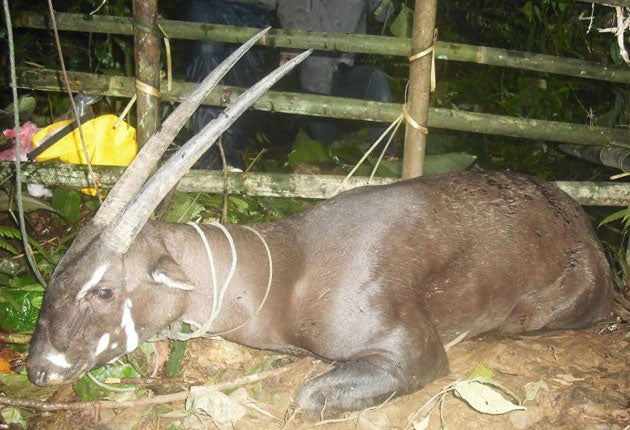Your support helps us to tell the story
From reproductive rights to climate change to Big Tech, The Independent is on the ground when the story is developing. Whether it's investigating the financials of Elon Musk's pro-Trump PAC or producing our latest documentary, 'The A Word', which shines a light on the American women fighting for reproductive rights, we know how important it is to parse out the facts from the messaging.
At such a critical moment in US history, we need reporters on the ground. Your donation allows us to keep sending journalists to speak to both sides of the story.
The Independent is trusted by Americans across the entire political spectrum. And unlike many other quality news outlets, we choose not to lock Americans out of our reporting and analysis with paywalls. We believe quality journalism should be available to everyone, paid for by those who can afford it.
Your support makes all the difference.The first confirmed sighting in more than a decade of one of the rarest animals in the world, described as the "Asian unicorn", was revealed today.
But the saola died after villagers took it into captivity in a remote region of Laos, conservationists said.
The critically endangered mammal, which is found in the mountains of Vietnam and Laos, was first discovered in 1992.
The animal, which looks similar to the antelopes of North Africa, but is more closely related to wild cattle, is so elusive it has been likened to the unicorn, despite having two horns, the International Union for Conservation of Nature (IUCN) said.
It has never been seen by conservation experts in the wild and the last confirmed sighting was from camera traps in 1999.
The animal is listed as critically endangered, with just a few hundred thought to exist in the wild.
Conservationists said that with none in zoos and almost nothing known about how to keep them in captivity, if the species vanish in the wild they will be extinct.
The Laos government said villagers in the country's central province of Bolikhamxay captured the saola in late August and brought it back to their village.
When news of the capture reached the authorities a team was sent, advised by the IUCN and Wildlife Conservation Society (WCS), to examine and release the animal.
Unfortunately the adult male saola was weakened by several days in captivity and died shortly after the team reached the remote village. It was photographed while still alive.
IUCN saola working group coordinator William Robichaud said: "The government of the Lao People's Democratic Republic and WCS are to be commended for their rapid response and efforts to save this animal.
"We hope the information gained from the incident can be used to ensure that this is not the last saola anyone has a chance to see."
The provincial conservation unit of Bolikhamxay province said the animal's death was "unfortunate" but the incident confirmed an area where it was still found and the government would immediately strengthen conservation efforts there.
And Dr Pierre Comizzoli, a member of the IUCN saola working group, said study of the animal's carcass could yield some good from the incident.
"Our lack of knowledge of saola biology is a major constraint to efforts to conserve it.
"This can be a major step forward in understanding this remarkable and mysterious species.
"It's clear that further awareness-raising efforts about the special status of saola are needed but the saola doesn't have much time left.
"At best a few hundred survive, but it may be only a few dozen. The situation is critical."
It is not clear why the villagers, who reportedly found the animal in the village's sacred forest, took the saola into captivity, but the authorities are urging villages in the area not to capture them and to release any they might encounter.

Join our commenting forum
Join thought-provoking conversations, follow other Independent readers and see their replies
Comments